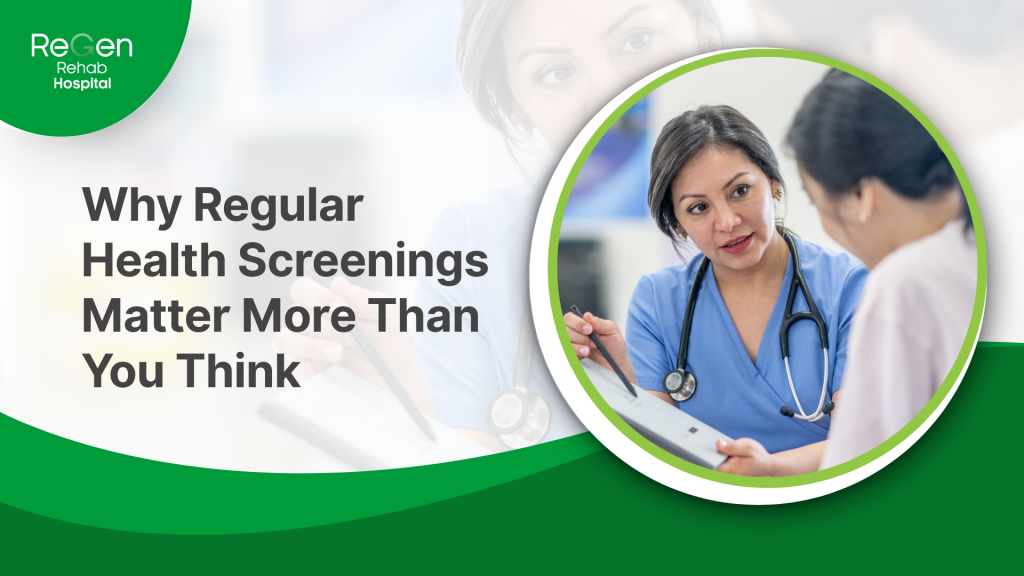Many people assume that health screenings are only necessary when symptoms appear. However, the reality is that many serious health conditions such as hypertension, diabetes, and certain cancers can develop silently. They often show no warning signs until they have progressed significantly. Regular health screenings serve as a proactive measure to detect these conditions early, increasing the chances of effective treatment and better long-term outcomes.
What Are Health Screenings?
Health screenings are preventive medical evaluations aimed at identifying diseases or risk factors in individuals who appear healthy. These assessments are designed to detect conditions like high blood pressure, high blood glucose, abnormal cholesterol levels, and some forms of cancer. When detected early, these conditions can often be managed more easily, more affordably, and with better success.
The Importance of Early Detection
Chronic conditions such as high blood pressure and diabetes often go unnoticed because they present no symptoms in their early stages. By the time symptoms develop, significant damage may have already occurred. For example, unmanaged hypertension can lead to heart attacks, stroke, or kidney failure.
Early detection through regular screenings can:
- Prevent complications before they arise
- Improve treatment effectiveness and outcomes
- Lower long-term healthcare costs
- Offer peace of mind and encourage healthier lifestyle choices
Common Health Screenings You Should Consider
The type of screening you need depends on your age, gender, family history, and individual risk factors. Below is a general guideline:
| Screening Test | Who Should Get It | How Often |
|---|---|---|
| Blood pressure | Adults ≥ 18 years | At least once a year |
| Blood glucose (diabetes) | Adults ≥ 30 years, or at risk | Every 1–3 years, more frequent if at risk |
| Cholesterol (lipid profile) | Adults ≥ 20 years | Annually, more frequent if at risk |
| Pap smear (Cervical) | Sexually active women aged 20–65 years | Annually for 2 years, if normal then every 3 years (Pap); 5 years with HPV test |
| Mammogram (Breast) | Women ≥ 40 years | Every 2 years; more frequent if at risk |
| Colorectal cancer screening | Adults with family history of colo-rectal cancer; or recommended by healthcare provider | Depending on risk factors |
Sources: Summary of Malaysian Family Medicine Specialists’ Association (FMSA) – Consensus Guide to Adult Health Screening for the General Population Attending Primary Care Clinics (2015); Ministry of Health Malaysia – Guidelines for Cervical Cancer Screening in Malaysia (2023)
Addressing Common Misconceptions
Despite the benefits of screenings, many people avoid them due to common misconceptions or fears. Addressing these concerns is important:
- “I feel fine, so I don’t need a check-up.”
Feeling healthy does not always mean you are healthy. Many conditions have no symptoms in their early stages.
- “Screenings are too expensive.”
Your health is a valuable asset. Screenings are a proactive way to protect it by detecting issues early, helping prevent serious complications and higher medical costs in the future.
- “I’m afraid of what they might find.”
Discovering a health issue early improves the chances of successful treatment. Ignoring the problem increases the risk of serious complications later.
What If You Skip Screenings?
When screenings are delayed or skipped, diseases may only be discovered at advanced stages. At this point, treatment becomes more complex, costly, and sometimes less effective. For example, many cancers are treatable when found early but become life-threatening if diagnosed late. Regular check-ups help keep you informed and allow early interventions that can save lives.
Final Thoughts
Health screenings are essential for everyone, not just those who are unwell. They enable early detection of potential health issues, promote long-term well-being, and improve the quality of life. Prioritizing routine health check-ups is a proactive step toward a healthier future. Take charge of your health today—your future self will thank you.
Taking the First Step
If you are unsure where to begin, start with basic screenings such as blood pressure, glucose, and cholesterol checks. These simple assessments offer valuable insight into your current health status. Taking charge of your health starts with a single step. Schedule your screening today and encourage your loved ones to do the same.
References
- Consensus Guide to Adult Health Screening for General Population Attending Primary Care Clinics. 1st ed. Family Medicine Specialists Association of Malaysia; 2015. fms-malaysia.org
- GUIDELINES for CERVICAL CANCER SCREENING in MALAYSIA 2023. https://www2.moh.gov.my/moh/modules_resources/bookshelf/Guidelines_For_Cervical_Cancer_Screening_in_Malaysia_2023/Guidelines_For_Cervical_Cancer_Screening_in_Malaysia_2023.pdf
- Institute for Health Systems Research (IHSR), National Institutes of Health, Ministry of Health Malaysia. 2020. National Health and Morbidity Survey (NHMS) 2019: Vol. II: Healthcare Demand.
- MANAGEMENT of COLORECTAL CARCINOMA. https://www.moh.gov.my/moh/resources/penerbitan/CPG/QR%20Management%20of%20Colorectal%20%20Carcinoma.pdf

